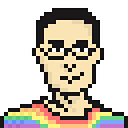Member-only story
The key to life is earning the right to always be told that, “You have potential.”
In my 30s, I had the good fortune to work with AARP and to have the opportunity to think about life after 50 when I hadn’t nearly gotten there yet. It changed my perspective on aging.
Until that point, I hadn’t considered how age-ism operates in our world. And yet I knew that whenever I imagined an older person, I’d think of someone who was keeled over, hard of hearing, and cantankerous in some way — which is how the TV and movies always seemed to depict them. Instead, through the members of AARP I encountered generations of people who came across as enlightened, unusually direct about their opinions, and at every turn freely sharing with me that their sex lives were magnificent.
One of my favorite observations was how the idea of “being old” is entirely relative. For instance, if you talk with someone in their 60s, they’ll say, while pointing to someone in their 70s, “I’m not old. She’s old!” And then when you hang out with someone in their 70s they’ll point at someone in their 80s and say, “I’m not old. He’s old!” And so on.
So when I had the opportunity to participate in a fireside chat with Medium’s VP of Product Design, Alexis Lloyd, and the Medium community, and when a question arose as to my career’s various arcs and “the why” behind it all, I guess my answer of, “I don’t know” had an off-tune landing.
Maybe it’s because I’ve been long fascinated with the end of life. And by acknowledging it, I’ve tried to discount its existence as much as possible.
I mean, there’s that whole Simon Sinek trope about “know the WHY” and so forth — it only makes sense that someone like me would know my WHY. But I really don’t. And then it hit me that the “don’t you know your WHY?” question isn’t something one would ask someone much younger than myself, but it might feel a bit disturbing as to why a more senior person doesn’t have a good WHY. I mean, isn’t that what WHY-se people do with themselves?
